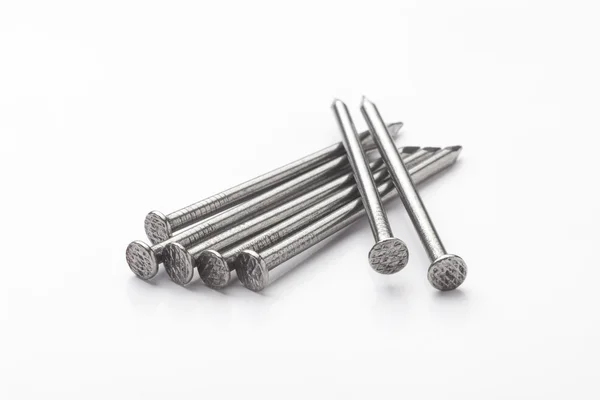Finding the Best Box Nail: A Comprehensive Review
Whether you’re an avid DIY enthusiast or a professional carpenter, having the right box nail assortment at your disposal is essential for a successful project. Amazon offers a wide range of box nail products, and we’ve compiled a list of the five best options to help you find the perfect fit for your needs. From hanging pictures to woodworking, these products offer versatility, durability, and ease of use.
To see our related product guide article, click here.
Top Picks for Best Box Nail
Mr. Pen Box Nail Assortment Kit, 600 Pcs
The Mr. Pen Nail Assortment Kit comes with an impressive 600 pieces in four different sizes, making it an ideal choice for various projects. The nails are galvanized, ensuring excellent corrosion resistance and durability. Whether you need small nails for delicate picture hanging or sturdy hardware nails for heavy-duty tasks, this kit has you covered. The black finish adds a touch of elegance, making them suitable for both functional and decorative purposes.
Pros:
- Versatile assortment with four sizes
- Galvanized for enhanced durability
- Black finish for an aesthetic appeal
Cons:
- Some users might prefer a larger quantity of nails in each size
Jegonfri 376pcs Premium Hardware Box Nail Assortment Kit
This 376pcs Premium Hardware Box Nail Assortment Kit is a perfect companion for any woodworking or picture hanging project. With six different sizes, ranging up to a maximum length of 2 inches, you’ll have the right nail for any job. The galvanized coating ensures excellent resistance against rust and corrosion, guaranteeing a long-lasting hold. The included storage box keeps the nails organized and easily accessible.
Pros:
- Six sizes to cover various needs
- Galvanized coating for increased longevity
- Convenient storage box for easy access
Cons:
- Some users may not need such a side variety of options
Hillman Silver Polished Box Nail Pack
The Hillman Polished Box Nails stand out with their polished silver finish, adding a touch of sophistication to your woodworking projects. This pack includes 30 pieces of 2-inch nails, perfect for those looking for a smaller quantity with the assurance of premium quality. The nails’ smooth surface and tapered design ensure easy insertion and secure fastening.
Pros:
- Polished silver finish for an elegant look
- Ideal for smaller projects or to try out the product
- Smooth surface and tapered design for easy installation
Cons:
- Limited quantity compared to other kits
The Hillman Group 532590 Box Nail Pack
The Hillman Group 532590 Box Nails are specifically designed for heavy-duty tasks. With a length of 1-1/2 inches, these nails provide a strong hold for demanding woodworking and construction projects. The galvanized construction ensures excellent resistance to outdoor elements, making them suitable for both indoor and outdoor use.
Pros:
- Heavy-duty nails for robust projects
- Galvanized for enhanced durability
- Versatile for indoor and outdoor applications
Cons:
- The pack contains a smaller quantity of nails
Maexxna 1080pcs Box Nail Assortment Kit
The Maexxna Nail Assortment Kit boasts an extensive collection of 1080 pieces, providing an array of nails for all your woodworking and hanging needs. These small nails are perfect for delicate projects like picture hanging and finishing tasks. Whether you’re a hobbyist or a professional, this kit offers excellent value and convenience for various applications.
Pros:
- Large assortment with 1080 pieces
- Suitable for delicate projects and picture hanging
- Versatile and reliable for various applications
Cons:
- Some users may prefer a specific size assortment
Conclusion
Having the right box nail assortment is crucial for successful woodworking, picture hanging, and construction projects. Each of these five products on Amazon offers unique features and advantages to cater to different project requirements. Whether you need a versatile assortment, heavy-duty options, or a combination of flat head and concrete nails, these products will undoubtedly meet your needs and deliver exceptional results.
What Should You Look for in a Box Nail?
When selecting a box nail, there are several essential factors to consider to ensure you choose the right type for your specific project and needs. Here are some key aspects to look for in a box nail:
- Nail Size: Box nails come in various sizes, ranging from small finishing nails to larger construction nails. Choose the size that best suits your project requirements. For delicate tasks like picture hanging, small-sized nails are preferable, while heavy-duty construction projects may require larger-sized nails.
- Material: The material of the box nail determines its durability and resistance to corrosion. Common materials include steel, stainless steel, and galvanized steel. Galvanized nails are coated with zinc, providing excellent corrosion resistance, making them suitable for outdoor projects.
- Nail Type: Different nail types are designed for specific purposes. For instance, finishing nails have small, rounded heads for a clean appearance, while concrete nails are hardened to penetrate concrete and masonry surfaces.
- Head Style: Box nails come with different head styles, such as flat heads or round heads. The head style can affect the nail’s holding power and appearance. Flat heads are often used for general woodworking and picture hanging, while round heads provide more surface area for enhanced holding capacity.
- Usage: Consider the specific applications for which you’ll be using the nails. Some box nails are designed for general use, while others are specialized for particular materials or tasks, such as picture hanging, framing, or concrete work.
- Quantity and Packaging: Check the quantity of nails in the box or kit to ensure it meets your project needs. Also, consider the packaging; some products come in organized storage boxes, making it easier to access and keep track of the nails.
- Brand and Quality: Choose reputable brands known for producing high-quality nails. Quality box nails will have consistent dimensions, reliable holding power, and consistent coatings.
- Application Surface: Consider the surface material on which you’ll be using the nails. Some nails are designed for wood, while others are suitable for concrete, masonry, or metal surfaces.
- Corrosion Resistance: For outdoor or humid environments, select nails with excellent corrosion resistance, such as galvanized or stainless steel nails, to prevent rusting and prolong their lifespan.
- Compatibility: Ensure the box nails are compatible with your nail gun or hammer if you plan to use them with power tools.
By considering these factors, you can make an informed decision and choose the right box nails that best suit your project needs, ensuring secure and reliable results.
Frequently Asked Questions
What is a box nail?
A box nail is a type of nail that is commonly used in woodworking and construction projects. It is characterized by its slender and rectangular cross-section, which gives it the name “box” nail. Box nails have a smooth shank, which means they are free of the spiral or ringed ridges found on some other types of nails like common nails or spiral nails.
The distinguishing feature of a box nail is its reduced diameter compared to other nails with the same length. This reduced diameter allows the nail to be driven into wood with less splitting, making it ideal for use in delicate or thin pieces of wood.
Box nails are available in various lengths and diameters to accommodate different projects, from light-duty tasks like picture hanging and finish work to heavier applications like framing and construction. They are commonly used for joining wood pieces together, fastening trim, installing molding, and attaching other materials where appearance is important, as their slender design leaves a smaller, less noticeable hole after driving.
When choosing box nails, it is important to consider the material, size, and application to ensure that the nail is suitable for the specific project at hand. Additionally, box nails are available in different materials, including steel, stainless steel, and galvanized steel, each offering varying levels of corrosion resistance. Selecting the appropriate box nail will ensure a strong and secure connection while preserving the appearance of the woodwork.
What is a box nail used for?
Box nails are commonly used for various woodworking and construction applications. Their unique design and features make them suitable for specific tasks where appearance and functionality are important. Here are some common uses of box nails:
- Finish Carpentry: Box nails are often used in finish carpentry tasks, such as installing baseboards, crown molding, trim, and other decorative elements. The smaller diameter of box nails reduces the risk of splitting the wood when driven, making them ideal for delicate finishing work.
- Picture Hanging: Box nails are popular for hanging pictures and artwork on walls. Their slender design minimizes the size of the nail hole, leaving a neat and inconspicuous appearance.
- Cabinet Making: When assembling cabinets and furniture, box nails provide a secure and neat joining method for parts that need to be hidden or require a clean finish.
- Framing and General Carpentry: While box nails are not as robust as common nails, they can still be used in light framing projects or general carpentry tasks where a smaller, less noticeable hole is desired.
- Crafts and DIY Projects: Box nails are suitable for various crafts and DIY projects where appearance and precision are crucial, such as building small wooden boxes, picture frames, or decorative items.
- Interior Trim Work: Installing interior trim elements, such as door casings, window trim, and chair rails, is well-suited for box nails due to their fine appearance and less intrusive effect on the wood surface.
- Molding Installation: Box nails work well for attaching different types of moldings, like cove molding or quarter round molding, providing a clean and secure fastening.
- Restoration Work: When restoring antique furniture or delicate wooden pieces, box nails can be used to maintain the original appearance and minimize damage.
It’s important to note that box nails are not suitable for heavy-duty construction tasks, structural framing, or load-bearing applications. For such purposes, other types of nails, such as common nails or framing nails, are more appropriate due to their larger diameter and higher holding strength.
Overall, box nails are versatile fasteners that are particularly well-suited for projects where a clean, neat appearance is essential, and where splitting the wood must be minimized. Choosing the right type and size of box nail will ensure a successful and visually pleasing result for your woodworking and construction endeavors.
What is the difference between a box nail and a casing nail?
Box nails and casing nails are two different types of nails commonly used in woodworking and construction, and they have distinct characteristics that make them suitable for specific applications. If you want to read more about casing nails, see our product review article here and our product guide article here. Here are the main differences between box nails and casing nails:
Shank Design:
- Box Nails: Box nails have a smooth shank, which means they lack the spiral or ringed ridges found on some other nails. The smooth shank allows box nails to be driven into wood with less splitting, making them ideal for delicate or thin pieces of wood.
- Casing Nails: Casing nails, on the other hand, have a “fluted” or “ribbed” shank design. The fluted shank provides better holding power and increased resistance to withdrawal, making them suitable for securing trim, molding, and other finishing elements.
Head Style:
- Box Nails: Box nails typically have flat heads or slightly rounded heads. The flat head style provides a clean and flush appearance when driven into the wood, leaving a minimal and less noticeable hole.
- Casing Nails: Casing nails usually come with larger and more decorative heads. The larger head provides greater holding strength, and the decorative design complements the aesthetics of finish work, such as trim installation.
Applications:
- Box Nails: Box nails are commonly used in finish carpentry and delicate woodworking tasks. They are ideal for applications where appearance is crucial, such as picture hanging, installing trim, and finish work.
- Casing Nails: Casing nails are specifically designed for securing casings, moldings, baseboards, and other finish elements. Their fluted shank and larger head provide the necessary strength and holding power for attaching these finishing components to walls and surfaces.
Usage Considerations:
- Box Nails: Due to their slender design, box nails are not suitable for heavy-duty tasks or load-bearing applications. They are best used in scenarios where a smaller and less conspicuous hole is desired.
- Casing Nails: Casing nails are more robust and can handle heavier loads. They are better suited for securing heavier trim pieces and other finish elements that require a stronger and more secure attachment.
In summary, the main differences between box nails and casing nails lie in their shank design, head style, and applications. Box nails are intended for delicate finish work and projects where appearance is paramount, while casing nails are specifically designed for securing trim and molding elements with increased holding power and durability. Choosing the right type of nail for your specific woodworking or construction project will ensure the best results and a visually pleasing finish.
editor's pick
news via inbox
Stay one step ahead with exclusive tips, guides, and offers delivered directly to your inbox.
Sign up for our newsletter and elevate your home improvement game today!







